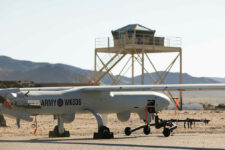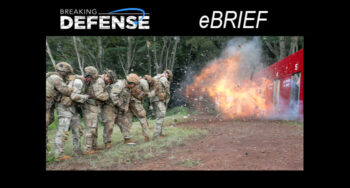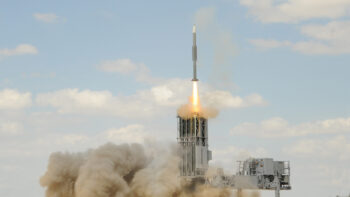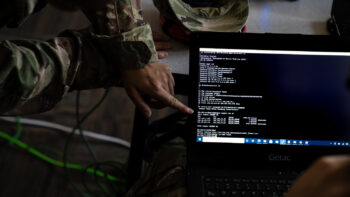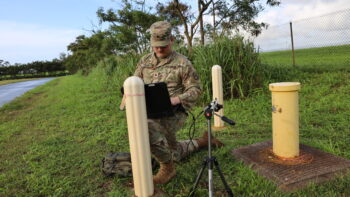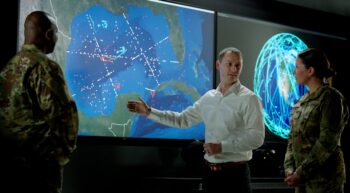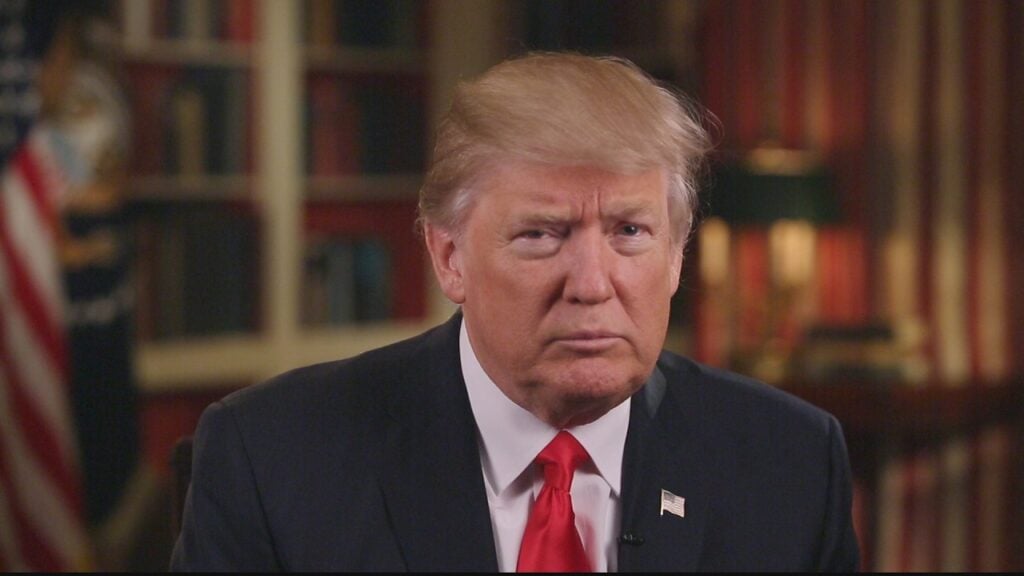
President Donald Trump
WASHINGTON: North Korea probably has its own reasons for putting Guam back on the targeting map, but they did it on the same day President Trump officially refused to certify the nuclear deal with Iran. Trump said he “cannot and will not” certify the deal as being in America’s national interest and threatened to cancel it if Congress and the allies don’t fix it.
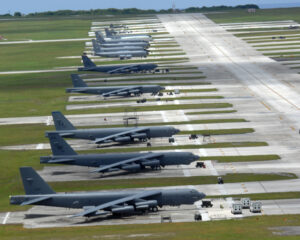
B-52s and other US aircraft at Guam’s Andersen Air Force Base.
Even if there is no connection between the two events, the fact remains that they will occupy the attention of the highest reaches of the US government. Coping with two major strategic challenges at the same time (forget all those operations in Afghanistan, Iraq, Yemen, Syria, the Philippines…) and the politics attending the Iran decision would be a challenge for any White House.
The immediate, tangible effect of today’s announcement was to impose sanctions on Iran’s Islamic Revolutionary Guard Corps, which controls much of the country’s military, economy, and foreign policy. “The Revolutionary Guard is the Iranian leader’s corrupt personal terror force,” Trump said. “It has hijacked large portions of Iran’s economy and seized massive religious endowments to fund war and terror abroad…even plotting to bomb a popular restaurant right here in Washington, D.C.”
For the most part, Trump has simply transferred the decision about the Iran nuclear deal to Congress and America’s partners. The certification provision Trump invoked today isn’t in the actual agreement with Iran, which is called the Joint Comprehensive Plan of Action (JCPOA), and his refusal to certify has no direct effect on Iran. Instead, certification is part of the Iran Nuclear Agreement Review Act passed by Congress before the deal with Iran was actually signed, and decertification simply puts Congress on notice to act, as Trump emphasized in his remarks today:
“Congress has already begun to work to address these problems (with the deal),” the President said. “Key House and Senate leaders are drafting legislation that would amend the Iran nuclear agreement review act to strengthen enforcement, prevent Iran from developing an —this is so totally important— an intercontinental ballistic missile and make all restrictions on Iran’s nuclear activity permanent under US law.” (Again, note this is all about US law, not the international agreement itself — The Editors).
“I support these initiatives,” Trump said. “However, in the event we are not able to reach a solution working with Congress and our allies, then the agreement will be terminated. It is under continuous review and our participation can be cancelled by me as president at any time. As we have seen in North Korea, the longer we ignore a threat, the worse that threat becomes.”
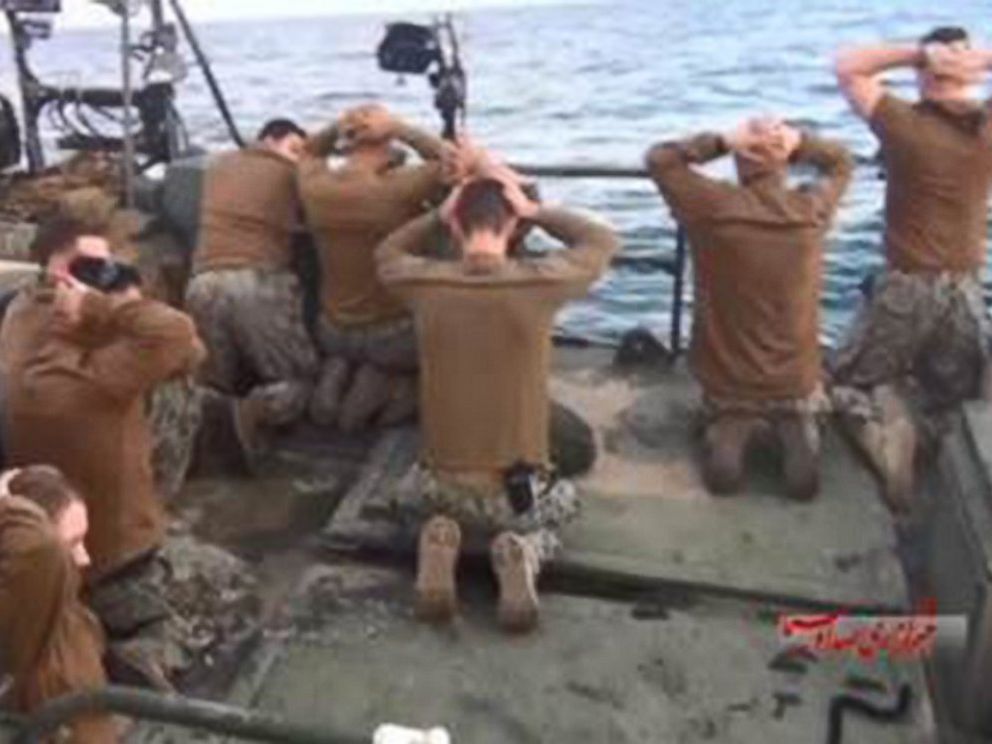
Navy sailors captured by Iran’s Islamic Revolutionary Guard Corps in the Persian Gulf
The New Strategy
If you want to understand why the president is decertifying the Iran deal, just look at the language in the “new strategy” released early this morning.
Much of Trump’s rationale seems to hinge on his assessment that the Obama administration did these things and he will fix them.
It also shows an intriguing casting of the Middle East in terms with which Saudi Arabia must be very happy: the US has focused too much on Sunni extremists (known to everyone else in the world as terrorists and ISIS) and not enough on “the longer-term threat of Iranian-backed militancy.”
- “The previous Administration’s myopic focus on Iran’s nuclear program to the exclusion of the regime’s many other malign activities allowed Iran’s influence in the region to reach a high-water mark.
- “Over the last decade and a half, United States policy has also consistently prioritized the immediate threat of Sunni extremist organizations over the longer-term threat of Iranian-backed militancy.
- “In doing so, the United States has neglected Iran’s steady expansion of proxy forces and terrorist networks aimed at keeping its neighbors weak and unstable in hopes of dominating the greater Middle East. Recently, the Iranian regime has accelerated the seeding of these networks with increasingly destructive weapons as they try to establish a bridge from Iran to Lebanon and Syria.
- “The Trump Administration will not repeat these mistakes.”
Trump called Iran “a terrorist nation like few others” in a speech before the very conservative Family Research Council’s Value Voters Summit this morning and said he would “take decisive action against those who would threaten our people with harm.” In his speech today, he catalogued Iranian offenses from the 1979 hostage crisis to its intervention in Syria today and denounced the nuclear deal as “one of the worst and most one sided transactions the United States has ever entered into.”

Arak Heavy Water Reactor in Iran
The chances of Congress taking America out of the JCPOA seem relatively low, as few lawmakers want to be held responsible for helping Iran pursue nuclear weapons again. But all that could change.
Meanwhile, North Korea, which had appeared to back off its threat to fire rockets near Guam, repeated the threat today, though at a lower level.

Kim Jong-un on North Korean TV
CNN reported that the North Korean official news agency quotes Kim Kwang Hak, a researcher at the Institute for American Studies of the North Korean Foreign Ministry: “We have already warned several times that we will take counteractions for self-defense, including a salvo of missiles into waters near the US territory of Guam.” Kim said the US military had taken actions that “lets us take our hand closer to the ‘trigger’ for taking the toughest countermeasure.”
Sen. Jack Reed, a West Point graduate and former paratrooper, talked with his hometown newspaper on the way home from a visit to the Demilitarized Zone (DMZ) between North and South Korea. The senior Democrat on the Senate Armed Services Committee told the Providence Journal we have reached “the most critical moment that we’ve had” on the Korean Peninsula and called it “probably the most dangerous situation that we face.” There was no indication Reed was aware of the renewed threat against Guam by North Korea.
Dean Cheng, the conservative Heritage Foundation’s expert on China and North Korea, said “the US can and should ignore” North Korea’s latest threat. “Talk is just talk,” he said. He believes leader Kim Jong Un may launch missiles near Guam. The US should retaliate if a missile appears aimed at Guam, but “near’ may have many definitions/
We’ll have to see how well will the White House, the Pentagon and Congress deal with this complex skein of threats, international and domestic politics and, above all, uncertainty.
Israel signs $583 million deal to sell Barak air defense to Slovakia
The agreement marks the latest air defense export by Israel to Europe, despite its ongoing war in Gaza.








